Hurricane Matthew, which prompted mass evacuations along the eastern seaboard, has passed, but its effects continue. North Carolina is seeing historic flooding and tens of thousands of people are without power from Virginia to Florida. In all, 27 people died as a result of the storm. The hurricane’s aftermath in the United States, however, is nothing like what Haiti is experiencing, where 1,000 people died, there are concerns about an outbreak of cholera, and 1.4 million people need humanitarian assistance.
There are many reasons why Hurricane Matthew wreaked more havoc on Haiti than the United States, including differences in infrastructure, as well as that Matthew made landfall in Haiti as a Category 4 hurricane. But undeniably, another reason why the United States fared better is that we have legions of world-class emergency management professionals who helped prepare for and respond to the storm and its impact. Natural disasters like Matthew remind us just how important these people are for safe and resilient communities.
One of the most visible and important emergency management leaders is the FEMA administrator. The current Administrator, Craig Fugate, has brought stability, organizational process and leadership to FEMA, and he has set the standard against which all future administrators will measured. The next administration will need to find a professional of equal skill, knowledge and leadership ability (assuming Fugate doesn’t want the job). In the second installment in this series, we consider some more people who may be tapped to take on one of the most critical jobs at the Department of Homeland Security.
 Anne Kronenberg, Executive Director, Department of Emergency Management (DEM), City & County of San Francisco – Taking over San Francisco’s DEM in December 2010, Ann Kronenberg leads the emergency operations for a community that is on a fault line that everyone fears could lead to one of this country’s biggest disasters. Prior to her present position, she helped lead the San Francisco Department of Public Health, where she was responsible for disaster preparedness, pre-hospital emergency medical services, medical surge, multiple casualty incidents and mass prophylaxis planning. If she didn’t already have her hands full with her present job, Kronenberg also serves as chair of the Approval Authority for the Bay Area Urban Area Security Initiative (UASI), which manages more than $150 million in federal homeland security grant funding for the 10 Bay Area counties. She also possesses significant experience in working on the federal, state and local levels of government.
Anne Kronenberg, Executive Director, Department of Emergency Management (DEM), City & County of San Francisco – Taking over San Francisco’s DEM in December 2010, Ann Kronenberg leads the emergency operations for a community that is on a fault line that everyone fears could lead to one of this country’s biggest disasters. Prior to her present position, she helped lead the San Francisco Department of Public Health, where she was responsible for disaster preparedness, pre-hospital emergency medical services, medical surge, multiple casualty incidents and mass prophylaxis planning. If she didn’t already have her hands full with her present job, Kronenberg also serves as chair of the Approval Authority for the Bay Area Urban Area Security Initiative (UASI), which manages more than $150 million in federal homeland security grant funding for the 10 Bay Area counties. She also possesses significant experience in working on the federal, state and local levels of government.
 Michael Dayton, Deputy Director, Department of Emergency Management (DEM), City & County of San Francisco – California has more than its share of experienced emergency management leaders, but Michael Dayton is among one its most accomplished. Having served three different governors with responsibilities for emergency management and homeland security functions, including as Acting Secretary for the California Emergency Management Agency and the Governor’s Homeland Security Advisor, Dayton now serves as San Francisco’s DEM Deputy Director overseeing the city and county’s Emergency Services Division and the Emergency Medical Services Agency. Given where he’s lived and worked most of this life, he’s spent considerable time working on earthquake readiness efforts, as well as other emergency preparedness, port and transit security, criminal justice, and victim services grant programs.
Michael Dayton, Deputy Director, Department of Emergency Management (DEM), City & County of San Francisco – California has more than its share of experienced emergency management leaders, but Michael Dayton is among one its most accomplished. Having served three different governors with responsibilities for emergency management and homeland security functions, including as Acting Secretary for the California Emergency Management Agency and the Governor’s Homeland Security Advisor, Dayton now serves as San Francisco’s DEM Deputy Director overseeing the city and county’s Emergency Services Division and the Emergency Medical Services Agency. Given where he’s lived and worked most of this life, he’s spent considerable time working on earthquake readiness efforts, as well as other emergency preparedness, port and transit security, criminal justice, and victim services grant programs.
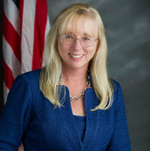 Eileen Decker, US Attorney, Central District of California – Leading the largest U.S. Attorney Office in the country outside of Washington, DC, and as the chief federal law enforcement officer, Eileen Decker is one of the most knowledgeable and experienced emergency management and homeland security leaders in the country. She could just as easily be on the short list to be the next DHS Secretary, but her 6 years as Deputy Mayor for Homeland Security and Public Safety for Los Angeles gave her significant oversight of the planning and operations for the city’s police, fire and emergency management departments. Decker has served as the liaison for Los Angeles to all federal law enforcement agencies, which is essential for effective planning and preparedness for the range of risks and threats the region faces.
Eileen Decker, US Attorney, Central District of California – Leading the largest U.S. Attorney Office in the country outside of Washington, DC, and as the chief federal law enforcement officer, Eileen Decker is one of the most knowledgeable and experienced emergency management and homeland security leaders in the country. She could just as easily be on the short list to be the next DHS Secretary, but her 6 years as Deputy Mayor for Homeland Security and Public Safety for Los Angeles gave her significant oversight of the planning and operations for the city’s police, fire and emergency management departments. Decker has served as the liaison for Los Angeles to all federal law enforcement agencies, which is essential for effective planning and preparedness for the range of risks and threats the region faces.
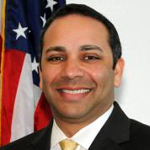 Arif Alikhan, Special Assistant for Constitutional Policing and Commanding Officer – Arif Alikhan brings significant and diverse experience to the table for consideration. City, state, federal and private sectors have all benefited from his skill and leadership, and that is something you hear from anyone who has ever worked with him. He’s been a police officer, prosecutor, deputy mayor, counterterrorism officer, as well as a DHS Assistant Secretary, educator and strategic advisor to a number of notable cities, states and government agencies. Now working at the LAPD as its Special Assistant for Constitutional Policing and Commanding Officer, Alikhan was previously been charged with protecting one of the world’s most prominent terrorism targets: the Los Angeles International Airport. Alikhan has always impressed those with whom he works for his approachability, focus on the facts and willingness to work with others. Those qualities and more make him a person to watch for future national leadership roles, whether at FEMA or elsewhere.
Arif Alikhan, Special Assistant for Constitutional Policing and Commanding Officer – Arif Alikhan brings significant and diverse experience to the table for consideration. City, state, federal and private sectors have all benefited from his skill and leadership, and that is something you hear from anyone who has ever worked with him. He’s been a police officer, prosecutor, deputy mayor, counterterrorism officer, as well as a DHS Assistant Secretary, educator and strategic advisor to a number of notable cities, states and government agencies. Now working at the LAPD as its Special Assistant for Constitutional Policing and Commanding Officer, Alikhan was previously been charged with protecting one of the world’s most prominent terrorism targets: the Los Angeles International Airport. Alikhan has always impressed those with whom he works for his approachability, focus on the facts and willingness to work with others. Those qualities and more make him a person to watch for future national leadership roles, whether at FEMA or elsewhere.
Darrell Darnell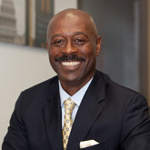 , GWU’s Senior Associate Vice President for Safety and Security – Darrell Darnell safeguards one of the country’s most prestigious institutions of higher learning: George Washington University (GWU). In safeguarding a busy campus as Senior Associate Vice President for Safety and Security, he has to work closely with his high-profile neighbors, who happen to be the White House, the State Department, several notable government buildings and embassies, all while keeping watch over one of the city’s busiest hospitals. His time leading DC’s Emergency Management team gave him plenty of training for his current role, as did his stint at the White House National Security Council, where he worked on critical infrastructure protection and resilience policy issues. He’s also the person responsible for connecting DC Emergency Management to social media in 2009, quickly recognizing the value-added it could provide to real-time operations of events in the nation’s capital.
, GWU’s Senior Associate Vice President for Safety and Security – Darrell Darnell safeguards one of the country’s most prestigious institutions of higher learning: George Washington University (GWU). In safeguarding a busy campus as Senior Associate Vice President for Safety and Security, he has to work closely with his high-profile neighbors, who happen to be the White House, the State Department, several notable government buildings and embassies, all while keeping watch over one of the city’s busiest hospitals. His time leading DC’s Emergency Management team gave him plenty of training for his current role, as did his stint at the White House National Security Council, where he worked on critical infrastructure protection and resilience policy issues. He’s also the person responsible for connecting DC Emergency Management to social media in 2009, quickly recognizing the value-added it could provide to real-time operations of events in the nation’s capital.
Jason McNamara, Senior Director for Emergency Management Programs, CNA Corporation – Bringing both public and private sector experience to the table is Jason McNamara. He served as Craig Fugate’s first Chief of Staff when he joined FEMA in 2009, where he helped further cement a number of the post-Katrina reforms that have made the Agency even stronger and more capable. After 4 years in that role, he left FEMA for the private sector to continue serving the emergency management mission. Today, he works as the Senior Director for Emergency Management Programs in the Center for Naval Analyses (CNA) Corporation. His time as a Hill staffer for the Select Committee on Homeland Security should not be forgotten, as he understands that the needs of congressional members, staffers and their interests cannot be ignored.
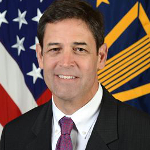 Tom Atkin, Acting Assistant Secretary of Defense for Homeland Defense and Global Security; retired Rear Admiral, USCG – While he may have “Acting” in front of his present title, there is nothing acting or temporary about Tom Atkin’s performance. During his distinguished 30-year U.S. Coast Guard (USCG) career, Atkin served as Chief of Staff to Adm. Thad Allen during the Hurricane Katrina emergency, where he helped the New Orleans and surrounding parishes get back on their feet. He also created the USCG’s Deployment Operations Group (DOG), and served at the National Security Council. Atkin is known for building rapport among diverse interests to serve mission goals. Like his friend and mentor former USCG Commandant Thad Allen, Atkin is a lifelong learner who is not afraid to ask questions or start a conversation to get smarter on topics he needs to understand. He’s also willing to step forward in tough situations to fix problems, as he had to do on countless occasions during the Hurricane Katrina recovery operations in addressing the leadership dysfunctions that existed from the New Orleans Mayor’s Office to the Louisiana Governor’s Office.
Tom Atkin, Acting Assistant Secretary of Defense for Homeland Defense and Global Security; retired Rear Admiral, USCG – While he may have “Acting” in front of his present title, there is nothing acting or temporary about Tom Atkin’s performance. During his distinguished 30-year U.S. Coast Guard (USCG) career, Atkin served as Chief of Staff to Adm. Thad Allen during the Hurricane Katrina emergency, where he helped the New Orleans and surrounding parishes get back on their feet. He also created the USCG’s Deployment Operations Group (DOG), and served at the National Security Council. Atkin is known for building rapport among diverse interests to serve mission goals. Like his friend and mentor former USCG Commandant Thad Allen, Atkin is a lifelong learner who is not afraid to ask questions or start a conversation to get smarter on topics he needs to understand. He’s also willing to step forward in tough situations to fix problems, as he had to do on countless occasions during the Hurricane Katrina recovery operations in addressing the leadership dysfunctions that existed from the New Orleans Mayor’s Office to the Louisiana Governor’s Office.
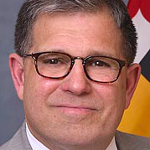 Dennis Schrader, Secretary of Appointments, Office of Maryland Governor Larry Hogan – He may be an industrial engineer by training, but Dennis Schrader is well-versed in the policies, operations and politics of emergency management. Having served as the Director of the State of Maryland’s Office of Homeland Security under then-Gov. Bob Ehrlich, Dennis Schrader joined FEMA Headquarters as its Deputy Administrator for National Preparedness. He has played significant leadership roles in advising federal, state, local, and private sector leaders on preparedness, resilience policies, critical infrastructure protection and healthcare operations. Today, he works in Annapolis as Maryland Governor Larry Hogan’s Secretary of Appointments, keeping the Free State in great shape.
Dennis Schrader, Secretary of Appointments, Office of Maryland Governor Larry Hogan – He may be an industrial engineer by training, but Dennis Schrader is well-versed in the policies, operations and politics of emergency management. Having served as the Director of the State of Maryland’s Office of Homeland Security under then-Gov. Bob Ehrlich, Dennis Schrader joined FEMA Headquarters as its Deputy Administrator for National Preparedness. He has played significant leadership roles in advising federal, state, local, and private sector leaders on preparedness, resilience policies, critical infrastructure protection and healthcare operations. Today, he works in Annapolis as Maryland Governor Larry Hogan’s Secretary of Appointments, keeping the Free State in great shape.
 Bruce Fitzgerald, Director, Maine Emergency Management Agency – While Maine does not have the epic challenges of a California or Florida, Maine still encounters its share of flooding, dangerous storms and brutal winters. Bruce Fitzgerald leads Maine’s efforts to keep those hazards at bay. He’s spent his entire career in service to the state, whether working for its members of Congress and various Governors or helping to stand up its homeland security operations in the years following the September 11 attacks. Fitzgerald has proven himself to be a great neighbor to other New England states in sharing best practices and providing assistance to those who have called upon him when needed. That’s one of the reasons he was tapped to be the Region 1 lead for all of NEMA, giving voice, insight and perspective to his fellow New Englanders.
Bruce Fitzgerald, Director, Maine Emergency Management Agency – While Maine does not have the epic challenges of a California or Florida, Maine still encounters its share of flooding, dangerous storms and brutal winters. Bruce Fitzgerald leads Maine’s efforts to keep those hazards at bay. He’s spent his entire career in service to the state, whether working for its members of Congress and various Governors or helping to stand up its homeland security operations in the years following the September 11 attacks. Fitzgerald has proven himself to be a great neighbor to other New England states in sharing best practices and providing assistance to those who have called upon him when needed. That’s one of the reasons he was tapped to be the Region 1 lead for all of NEMA, giving voice, insight and perspective to his fellow New Englanders.
 Ross Ashley, Senior Vice President, SAP National Security Services – During the early years of its operations, DHS/FEMA’s Grant Programs were essentially all over the map with little to no order, clarity or direction. Enter Ross Ashley, who took over as the Assistant Administrator for FEMA’s Grant Programs in the latter half of the Bush Administration and brought order and focus where chaos and confusion had previously reigned. He not only calmed the always turbulent waters with Congress but built a number of systems that allowed for greater transparency and effectiveness in the challenging grants processes. After leaving FEMA in 2009 for the private sector, Ashley went on to found and become the Executive Director for the National Fusion Center Association (NFCA), which represents the interests of all 78 State and Major Urban area Intelligence Fusion Centers. After handing over the reins of that organization, he joined SAP’s National Security Services Division as its Senior Vice President in 2015.
Ross Ashley, Senior Vice President, SAP National Security Services – During the early years of its operations, DHS/FEMA’s Grant Programs were essentially all over the map with little to no order, clarity or direction. Enter Ross Ashley, who took over as the Assistant Administrator for FEMA’s Grant Programs in the latter half of the Bush Administration and brought order and focus where chaos and confusion had previously reigned. He not only calmed the always turbulent waters with Congress but built a number of systems that allowed for greater transparency and effectiveness in the challenging grants processes. After leaving FEMA in 2009 for the private sector, Ashley went on to found and become the Executive Director for the National Fusion Center Association (NFCA), which represents the interests of all 78 State and Major Urban area Intelligence Fusion Centers. After handing over the reins of that organization, he joined SAP’s National Security Services Division as its Senior Vice President in 2015.
Bob Connors, Director, Preparedness and Crisis Management, Raytheon – Short of anyone working in the military or intelligence communities, Bob Connors is the only emergency manager I know of who has had to undertake emergency management plans on every continent on the planet. With more than 30 years at defense/aerospace leader Raytheon, Bob Connors has been one of the most vocal and proactive leaders in the private sector on the issue of preparedness. An early proponent of ANSI/NFPA 1600, the voluntary private sector preparedness standard endorsed by the 9/11 Commission in its final report, Connors is both practitioner and evangelist on these issues. As threats and risks have evolved, so too has Connors’ willingness to engage experts in cybersecurity to prepare his company, its customers and the country. Connors is also a former member of FEMA’s National Advisory Council and is active in the New England emergency management community.
 Marko Bourne, Principal, Booz Allen Hamilton – Another veteran of the FEMA executive leadership ranks, Marko Bourne previously served the agency as its Director of Policy, as well as in the senior ranks of its Preparedness Division. Working with Administrator David Paulison, he was instrumental in putting in place a number of the post-Katrina reforms that re-conditioned the agency to be a stronger, more responsive and collaborative unit. Now working with Booz Allen Hamilton for almost a decade, where he helps lead its emergency management practice, Bourne got his start in emergency management in the Commonwealth of Pennsylvania two decades ago.
Marko Bourne, Principal, Booz Allen Hamilton – Another veteran of the FEMA executive leadership ranks, Marko Bourne previously served the agency as its Director of Policy, as well as in the senior ranks of its Preparedness Division. Working with Administrator David Paulison, he was instrumental in putting in place a number of the post-Katrina reforms that re-conditioned the agency to be a stronger, more responsive and collaborative unit. Now working with Booz Allen Hamilton for almost a decade, where he helps lead its emergency management practice, Bourne got his start in emergency management in the Commonwealth of Pennsylvania two decades ago.
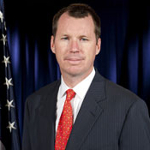 Tim Manning, Deputy Administrator for Protection and National Preparedness, FEMA – As one of the few Senate-confirmed appointees at FEMA, Tim Manning is one of the agency’s senior most leaders. Joining FEMA at the same time Craig Fugate took over in 2009, Manning came to the job from the New Mexico, where he had been the Enchanted State’s Director of the Office of Emergency Management and Deputy Secretary of the New Mexico Department of Public Safety for Emergency Services. A longtime active member of NEMA, Manning was also one of the early proponents for greater engagement by federal, state, local and tribal government engagement with the private sector in emergency preparedness and response. He also possesses firsthand experience as a former fighter, EMT and mountain rescue specialist.
Tim Manning, Deputy Administrator for Protection and National Preparedness, FEMA – As one of the few Senate-confirmed appointees at FEMA, Tim Manning is one of the agency’s senior most leaders. Joining FEMA at the same time Craig Fugate took over in 2009, Manning came to the job from the New Mexico, where he had been the Enchanted State’s Director of the Office of Emergency Management and Deputy Secretary of the New Mexico Department of Public Safety for Emergency Services. A longtime active member of NEMA, Manning was also one of the early proponents for greater engagement by federal, state, local and tribal government engagement with the private sector in emergency preparedness and response. He also possesses firsthand experience as a former fighter, EMT and mountain rescue specialist.
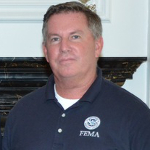 Jim McPherson, Federal Disaster Recovery Coordinator, FEMA Region I – FEMA may be the center of emergency management for the federal government, but the skills and leadership developed by the U.S. Coast Guard (USCG) prepare its leaders to handle the really tough days with professionalism and effectiveness. Those words were shared with me by someone who has worked with USCG Captain Jim McPherson. Now working with FEMA Region I, McPherson previously served as the Chief of Staff for an 8-state Northeast region, stretching from the Canadian border to New Jersey. Those responsibilities included supervising operations supporting U.S. Marine Transportation System and Maritime Homeland Security for more than one million square miles of the Atlantic Ocean.
Jim McPherson, Federal Disaster Recovery Coordinator, FEMA Region I – FEMA may be the center of emergency management for the federal government, but the skills and leadership developed by the U.S. Coast Guard (USCG) prepare its leaders to handle the really tough days with professionalism and effectiveness. Those words were shared with me by someone who has worked with USCG Captain Jim McPherson. Now working with FEMA Region I, McPherson previously served as the Chief of Staff for an 8-state Northeast region, stretching from the Canadian border to New Jersey. Those responsibilities included supervising operations supporting U.S. Marine Transportation System and Maritime Homeland Security for more than one million square miles of the Atlantic Ocean.
 Juliette Kayyem, former DHS A/S and MA Homeland Security Advisor, CNN National Security Commentator – Juliette Kayyem is the self-described “Security Mom,” who brings phenomenal state and national security experience to the table. Politically savvy, thoughtful and an exceptional communicator, she also brings a common, practical and very human touch to homeland security and preparedness issues. That common touch is on full display whenever CNN or any other media outlet has her on to comment on homeland and national security issues, or whenever she issues another of her podcasts on WGBH out of Boston. The one-time Massachusetts Democratic gubernatorial candidate may want to bow out of consideration for the FEMA post in favor of another run for Massachusetts governor, or an even bigger appointment in the next Administration, but she is a name and thought leader on the rise who garners a lot of respect from people on both sides of the political aisles.
Juliette Kayyem, former DHS A/S and MA Homeland Security Advisor, CNN National Security Commentator – Juliette Kayyem is the self-described “Security Mom,” who brings phenomenal state and national security experience to the table. Politically savvy, thoughtful and an exceptional communicator, she also brings a common, practical and very human touch to homeland security and preparedness issues. That common touch is on full display whenever CNN or any other media outlet has her on to comment on homeland and national security issues, or whenever she issues another of her podcasts on WGBH out of Boston. The one-time Massachusetts Democratic gubernatorial candidate may want to bow out of consideration for the FEMA post in favor of another run for Massachusetts governor, or an even bigger appointment in the next Administration, but she is a name and thought leader on the rise who garners a lot of respect from people on both sides of the political aisles.
 Becky Denlinger, Deputy Minister for Emergency Management, Ministry of Transportation & Infrastructure, Canada – This may be an absolute wildcard pick, but Becky Dellinger is someone who has led emergency management efforts on both sides of U.S.-Canada border. Now serving as Deputy Minister for Emergency Management for the Canadian Ministry of Transportation & Infrastructure, Dellinger previously served as Fire Commissioner for British Columbia, as well as Fire Chief in Cobb County, Georgia. Those who have worked with her speak admirably of her teamwork skills, and given the increasing complexity of risks, threats and disasters, having someone who has leadership experience on these issues with another country might be worthy of consideration for the future of FEMA’s leadership.
Becky Denlinger, Deputy Minister for Emergency Management, Ministry of Transportation & Infrastructure, Canada – This may be an absolute wildcard pick, but Becky Dellinger is someone who has led emergency management efforts on both sides of U.S.-Canada border. Now serving as Deputy Minister for Emergency Management for the Canadian Ministry of Transportation & Infrastructure, Dellinger previously served as Fire Commissioner for British Columbia, as well as Fire Chief in Cobb County, Georgia. Those who have worked with her speak admirably of her teamwork skills, and given the increasing complexity of risks, threats and disasters, having someone who has leadership experience on these issues with another country might be worthy of consideration for the future of FEMA’s leadership.
-
Same_old
-
Jerry Quinn
-
Tara Teyler-Moore


